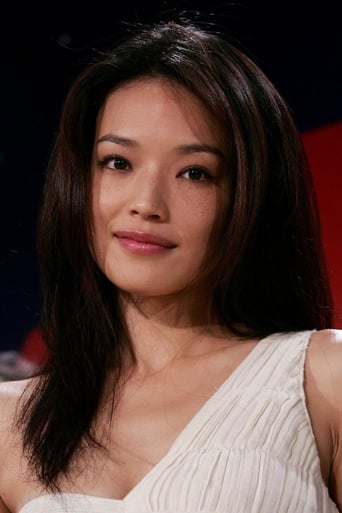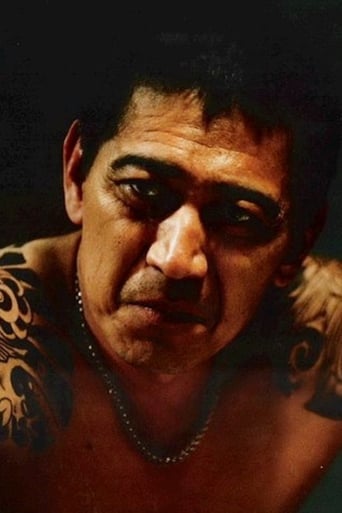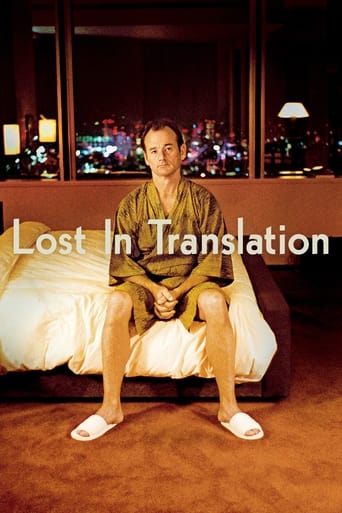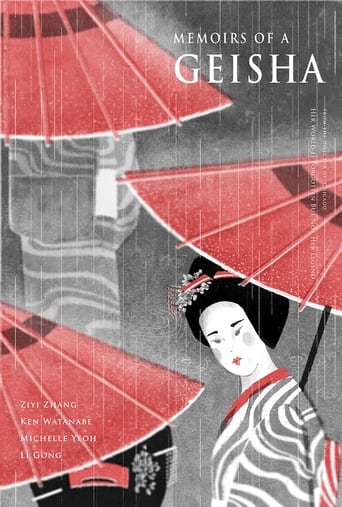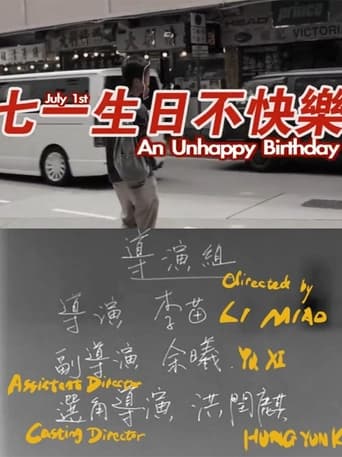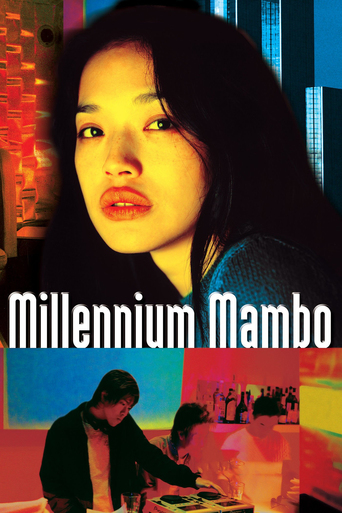
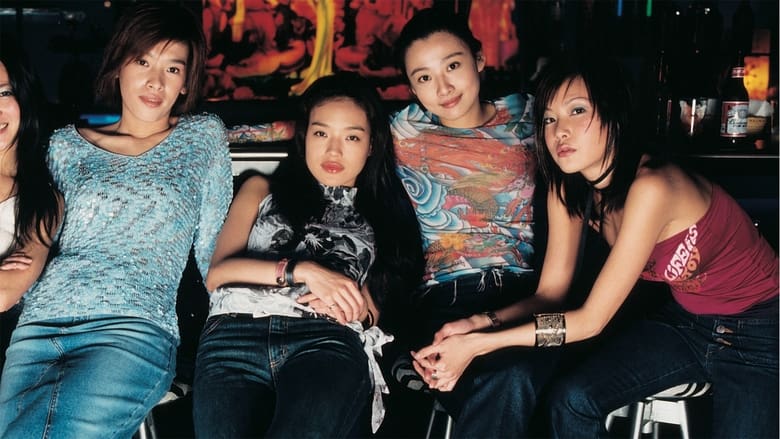
Millennium Mambo (2003)
The youthful Vicky is torn between two men, Hao-Hao and Jack. At night she works as a PR person at a night club to support both of them. Hao-Hao keeps vigilance over her all the time, no matter she is on or off the job. He checks her charge accounts, telephone bills, mobile phone records, and even her body odor in an attempt to trace Vicky’s activities. She cannot stand him any longer; she runs away.
Watch Trailer
Cast
Similar titles

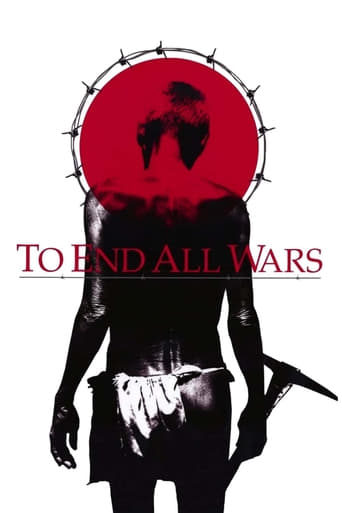
Reviews
Really Surprised!
It's entirely possible that sending the audience out feeling lousy was intentional
The movie's neither hopeful in contrived ways, nor hopeless in different contrived ways. Somehow it manages to be wonderful
I didn’t really have many expectations going into the movie (good or bad), but I actually really enjoyed it. I really liked the characters and the banter between them.
In a revealing interview included on the DVD, Hou Hsiao Hsien says he wanted "Millennium Mambo" to be a picture of Taipei night life and also "much more," a "multifaceted" film with "multiple points of view" that he would have liked to make six hours long; something post-modern and deconstructed and free-form and improvised, but "modernist" too in some aspects.The actual film isn't so much multifaceted or plot less as it is a portrait in the moment of a few people composed, with a voice-over from ten years later, from the point of view of a pretty middle-class girl called Vicky (The bee-sting-lipped, doe-eyed Qi Shu, who also stars in the present-day chapter of Hou's recent "Three Times") who's stuck in a dysfunctional relationship with a spoiled, also pretty, middle-class boy, the bleached-haired Hao Hao (Chun-hao Tuan), who does drugs and hits on Vicky when she least wants to be hit on and who won't work and, as Vicky's omnipresent voice-over tells us, at one point has stolen his dad's Rolex and pawned it for a lot of money. They live together and hang out at clubs and Vicky works at a bar as a "hostess," a euphemism for a lap dancer who does drugs and drinks with customers and probably has sex with them -- like Liang Ching (Annie Shizuka Inoh) the actress-narrator of Hou's 1995 "Good Men, Good Women." Vicky's bar job gets her involved with an older gangsterish man named Jack (Jack Kao, the actress Liang Ching's dead lover in "Good Men")."Millennium "Mambo" doesn't show us Taipei nightlife in any collective or panoramic sense. It shows us -- a few times -- the hazy corners of a few bright clubs with little crowds of attractive young people playing games and doing drugs and alcohol, and it shows us -- many times -- corners of the apartment where Vicky and Hao Hao live, and bits of a mountain town in Hokkaido, Japan where Vicky goes, invited initially by a couple of boys she meets.Atypically for Hou, the camera moves around quite a bit too in this film, following the people and hugging their faces and bodies -- but also lingering, in his old style, statically observing doorways, walls, light fixtures, or windows with a train going by outside. Many cigarettes are lit, many are smoked. Meth is puffed in a pipe. Hao Hao pouts. Vicky looks sad or angry. The couple break up, but Vicky comes back, or Hao Hao comes after her. It's approach/avoidance: he tells her she's from another planet, but he keeps getting her back. Jack is an oasis for Vicky; but at a crucial time in winter when she goes to Japan, he isn't available, leaving her a key and a cell phone, to wander the streets. She lies in bed. She stares out the window. In a long outtake on the DVD about her Japan sojourn, Jack actually calls her and she's got a cold. In the final cut, he never calls, and she remains healthy. What's left isn't much, though as always for Hou and for many Chinese directors, the visuals are lush and beautifully lit, even if the frames are empty and the plot line, though never absent as his interview promises, goes nowhere. "Millennium Mambo's" reference to the end of the millennium (and perhaps changes in China and Hongkong?) seems, like the six-hour movie and the portrait of Taipei nightlife Hou promises in his interview, to have come to us as little more than the pretty but empty fragments of a vague, lost intention. This is a remake of Antonioni's "L'Avventura," in winter, with young attractive Asians -- and Qi Shu as the new Monica Vitti -- but without the world-weariness or awareness of any sort of fading cultural heritage, and with, instead of Antonioni's haunting white noise, a nagging techno score.
Concerning various aspects of everyday people's lives in Taiwan, it seems natural for Hou Hsiao-Hsien to desire to make a film about the doping youth in Taipei. But it may not be his realm and the attempt appears to be failed. Generally youth culture in a film shines when a youngster who is fascinated about it makes the film. It may not be impossible for the older to do it, but the filmmaker has to be at the youth's eye level. Hou Hsiao-Hsien did it from the older generation's viewpoint; as a result, even if it is accurately depicted, the youth scene looks dull. Besides, out-focused long takes, which Hou Hsiao-Hsien apparently adopted to yield the sense of being high, are just too painful to look at.
To my surprise this movie hasn't been reviewed, and from what I gather from other external reviews either they think its empty and boring, or believe that Hou Hsiao-Hsien has gone wrong. Neither is true.Hou has matured his style over the years, and instead of staying with the same historic movies he has moved to the present where he is needed the most. Finally we can see a depiction of the youth's life, which is common to the rest of the modern world, and we see the influence of the west, the decadence of a culture, the fast extinguishing life of a young woman. All seen through an objective heart, not judging or celebrating, but offering comprehension. Very often do we see movies made by the same young people or for commercial needs, when they are more interested in suprising you or make it a music video, and even when Hou uses music a lot he doesn't subordinate his camera or story to it.Maybe it hasn't had a proper release, but anyone with a chance to see it shouldn't miss it. This is a serious and difficult film, and even if you enjoy it for the first time (which is not common), you'll have to repeat the viewings to understand that the most valuable thing in the movie is Time, and Hou is a filmmaker in the true sense, a sculptor in time as Tarkovsky would had called him.
This wonderful film clings to my mind since I've seen it. This is not due to the story, but for the visual concept. At first, the story seems to be the usual fantasy insecure parents have about their teenage children getting lost in a world they don't know any more - in this case, a fragile young girl spending her time in the bars and clubs of nocturnal Taipei. But it is much more a coming-of-age story, told in a melancholy mood from a future perspective, mourning and accepting all the hardships it took. This is what the visuals of the film tell, more than the dialog or plot: Each scene is filmed in a single shot. Hou, or rather Mark Li, used available light most of the time, which actually produces meaning here: The scenes in bars and clubs are shot using very light-sensitive, so images are very grainy, dark, but warm and very color-intensive - one seems to be inside a protective womb, which becomes gradually oppressive. The forces that keep the girl inside are represented by her neurotic boy friend, who watches her constantly and keeps her from making exams.After she becomes a stripper, she meets Jack, a gangster but very decent guy who gradually leads her out of this world - in one scene he actually drives her out of a dark tunnel into bright daylight in his car. The outside scenes, given less sensitive film stock, are much clearer, but it's winter most of the time - contrary to the bar scenes it's cold, gray and white, but clear. The ending promises a life in the outside world, with occasional relief provided by movies. Shouldn't we all appreciate this? (... and the soundtrack is wonderful...)
